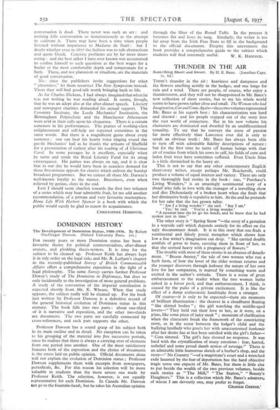DOMINION HISTORY
FOR twenty years or more Dominion status has been a favourite theme for political controversialists, after-dinner orators, and plodding thesis-writers. It is time for the subject to be cleaned up. Professor Keith has always kept it in tidy order on the legal side, and Mr. R. Latham's chapter in the recently-published Survey of British Commonwealth Affairs offers a comprehensive exposition in the light of a legal philosophy. The same Survey carries further Professor Dewey's study of The Dominions in Diplomacy, but does so only incidentally to the investigation of more general problems. A study of the convention of the imperial constitution is expected shortly from Mr. K. Wheare. When that study appears, the subject really will be cleaned up. For the book just written by Professor Dawson is a definitive record of the general historical evolution of Dominion status in this century. The book falls into two parts : about one-third of it is narrative and exposition, and the other two-thirds are documents. The two parts are carefully connected by cross-references, and each part supports the other.
Professor Dawson has a sound grasp of his subject both in its main outline and in detail. No exception can be taken to his grouping of the material into five successive periods, since he realises that there is always a carrying over of elements from one period into another. One of the most satisfactory features both of the exposition and the choice of documents is the stress laid on public opinion. Official. documents alone will not explain.the evolution of Dominion status ; Professor pawson supplements them with excerpts from newspapers, periodicals, &c. For this reason his selection will be more valuable to students than the more severe one made by Professor Keith. The selection, however, is not equally representative for each Dominion. In Canada Mr. Dawson can go to the fountain-head; but he takes his Australian opinion through the filter of the Round Table. In the process it becomes flat and loses its tang. Similarly, the writer is too far away from the Irish Free State to fill in the background to the official documents. Despite this unevenness the book provides a comprehensive guide to the subject which students will find extremely useful. W. K. HANcocK.






































 Previous page
Previous page